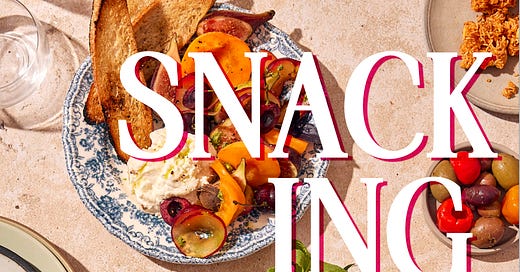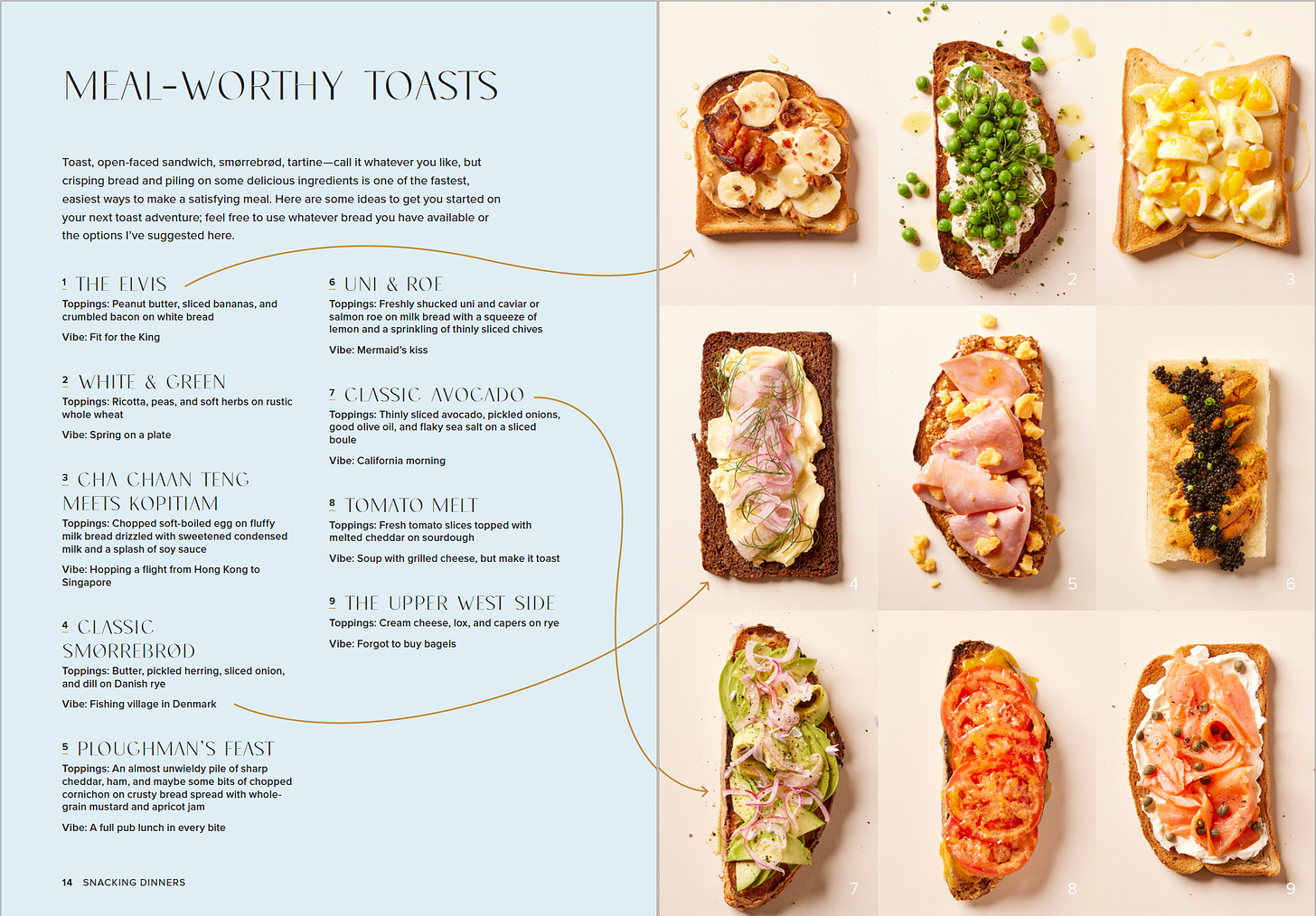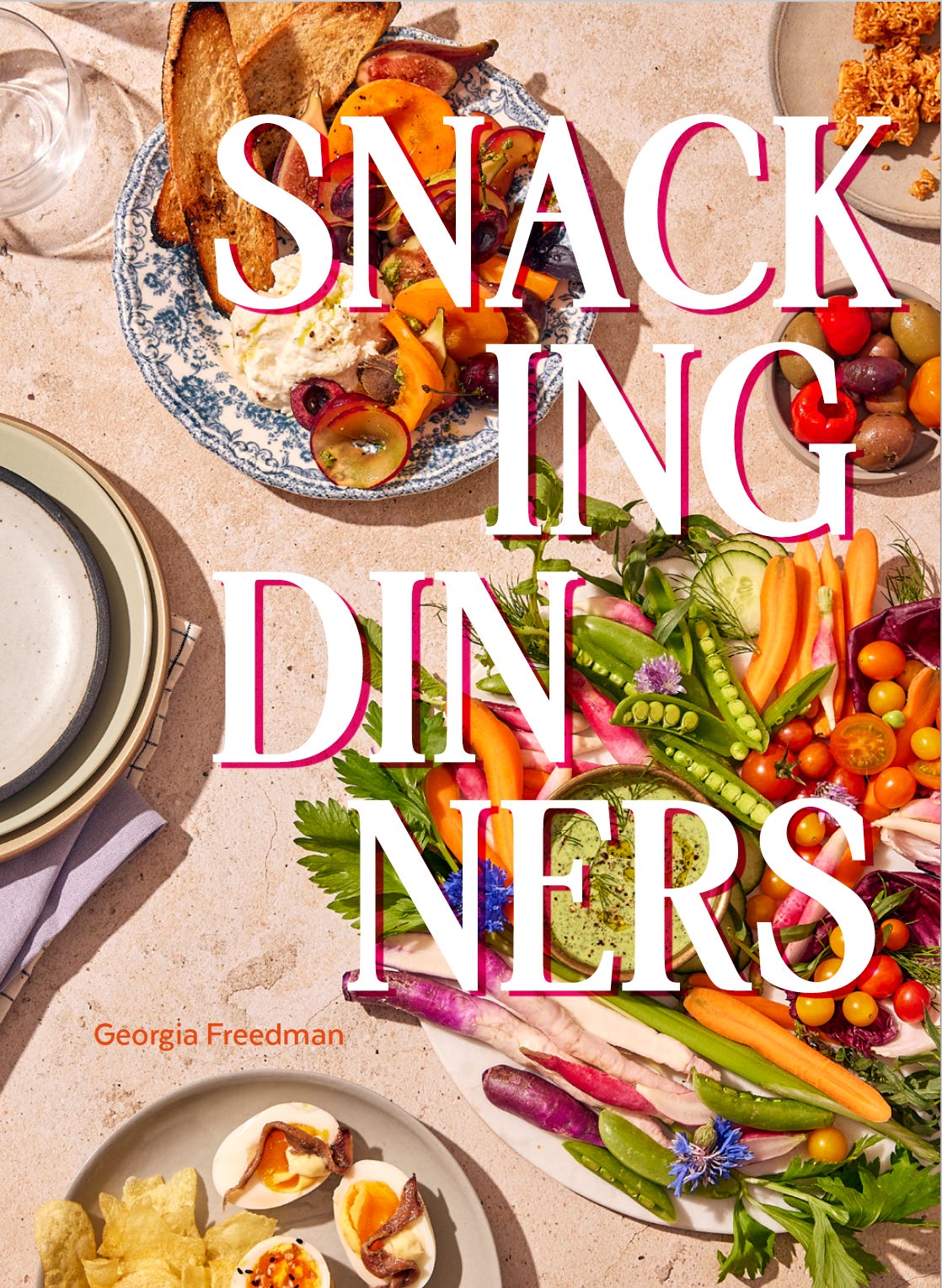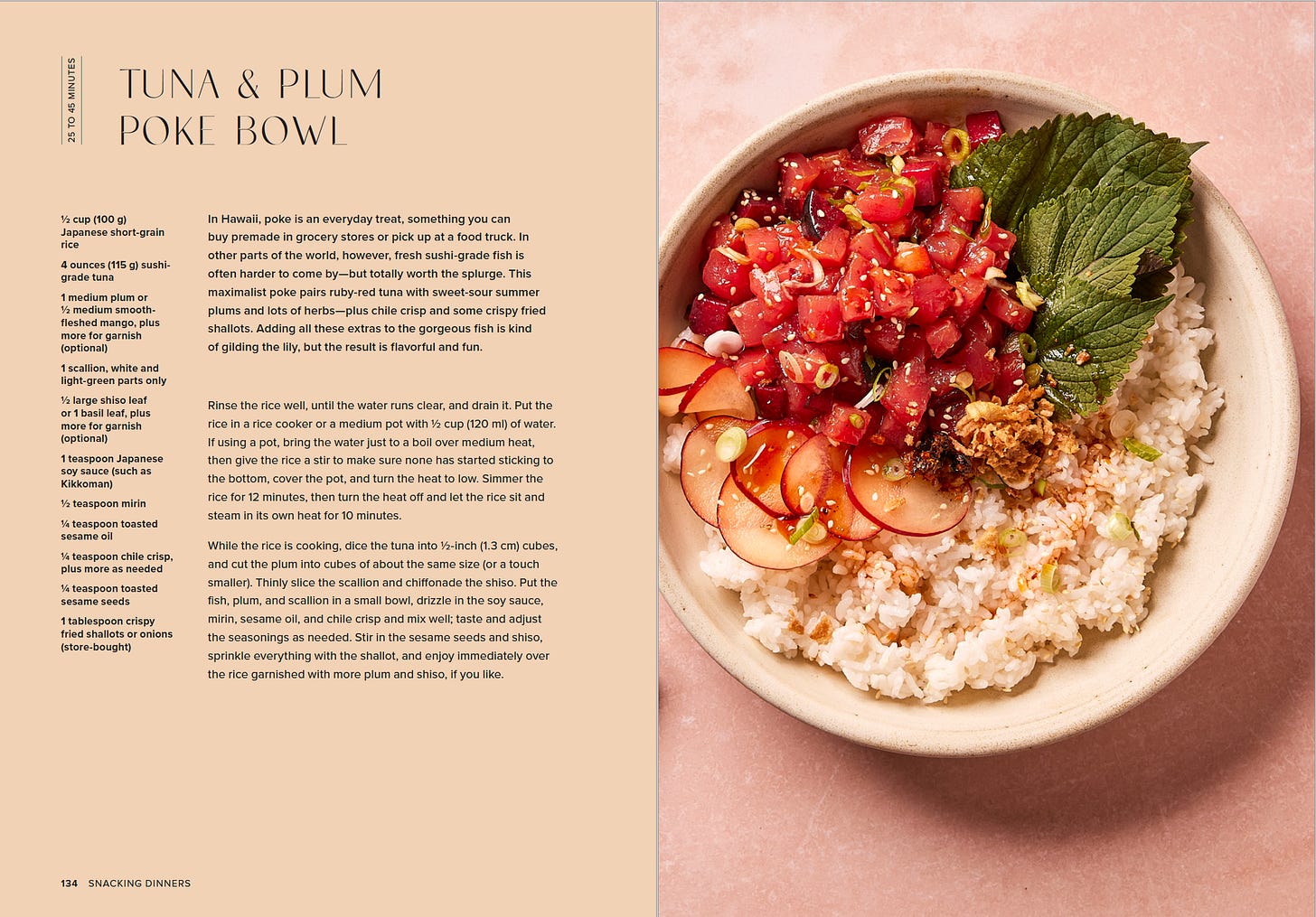How I Got a Book Deal in Just Two Weeks
Sometimes it takes years to write a proposal. Sometimes it only takes a few days.
Today’s newsletter is a little bit of inside baseball about cookbooks and how books get sold to publishing houses. If you’re curious about how books get made, read on. If you’re only here for the recipes, feel free to skip this one—your regular snack will arrive in your inbox over the weekend.
A little history of my journey writing and selling cookbook proposals:
My first cookbook proposal took me six months to write. I approached a dessert restaurant in Brooklyn I wanted to work with, The Chocolate Room, and together we worked on a proposal, wrote up example recipes, learned about comps and platforms and marketing plans, and found agents. Once we had a deal, we took one year to write There’s Always Room for Chocolate.
My second cookbook proposal took me five years to write. I moved to Southwestern China (to an area I’d studied in and visited before), researched the foods of that province, lost my visa and moved back to the states, returned to China as a tourist 2–4 times a year to continue my research, had a baby, started dragging her around China with me, and then, finally, wrote a proposal and sent it out. Two years (and many more research trips later!) that book, Cooking South of the Clouds, finally hit the market. (Note: This process was already in the works while I was working on my first book
My third proposal took even longer—an entire decade! This one, a co-write with my amazing friend Elizabeth Poett, was something she and I had been talking about for years (since before I wrote book number one). We wrote three different versions of this proposal, all with different approaches and marketing plans, before Elizabeth did something brilliant and pretty crazy—she found a production team, pitched herself as a tv star, and got a show on the Magnolia Network. We rewrote the proposal again (this time with a major platform!) and she got a nice deal for The Ranch Table.
Book proposal number four—for the book I’m currently writing with the three-Michelin-starred, World’s-Top-50 restaurant SingleThread—took two years. We weren’t expecting the process to take that long, but it’s going to be a really big, interesting, ambitious, complex book, and the proposal had to be equally ambitious and complex.
My fifth book proposal, the one for Snacking Dinners, took me, yes, just two weeks from idea to offer! I was working on the SingleThread proposal at the time, but my part was mostly done—we were waiting for the designers to do their things—and I knew I had at least six months before I could start writing the book itself. Casting about for something to do with myself (and a way to make some money!) I sent my agent an email with a paragraph about this idea and the three comps I’d found in my first (10-minute) search. She responded right away, asking me to write a one-page pitch she could send to a handful of editors, to gauge interest, and just two hours later I sent her my first attempt. While she sent that first taster into the world, and before I’d heard back from anyone at all, I started writing a mini proposal.
About a week-and-a-half later, we sent out that mini proposal, and four days after that I had an offer from the exact editor I was hoping for. (Sometimes dreams do come true!)
Here’s the book in question: Snacking Dinners—50+ Recipes for Low-Lift, High-Reward Dinners That Delight. I’d be super grateful if you’d pre-order a copy! (Pre-orders are a huge boost for sales rankings and encourage indie bookstores to stock the book.) And if you do, please sign up for the fun pre-order bonuses!
Obviously, this is a massive fluke for me. Given my past track record, I’m unlikely to repeat this series of events ever again. But I do think that I did a few things right that I can keep in mind for future projects:
What Went Right
I Didn’t Let the Idea Go Stale…Or Feel I Had to Wait Until I was the World’s Top Expert on the Subject Matter
This idea worked out quickly because it was timely and I went for it immediately. Usually I don’t utter a word about my ideas until I’ve done exhaustive research (often years and years of research). This is, I recognize, a common problem women face. Many of us feel we need to be recognized experts on a subject and have a really solid plan in place before we begin a project. Even for an idea like this one, where there isn’t really a way to become an “expert” (because it’s an idea I made up), I would still usually spend years trying to build up a blog on the subject before I even thought about starting a book proposal. In this case, I did it the other way around—book first, newsletter (this one you’re reading now!) second.
It helped that this was a small, digestible, easy-to-understand idea. I didn’t need to write a full-sized book proposal because the subject matter didn’t require it. And I leaned into that simplicity (with fantastic guidance from my agent, Danielle Svetcov).
I Reworked/Reframed an Old Idea
While the story above might make it sound like this book idea came out of the blue, the truth is that it actually came out of another, much larger idea I had already asked my agent about. (I sent her at least three other ideas that week before we landed on this one.) That larger book was a no-go at this stage in my career—looking at the comps told us that only people with huge platforms do well in that space—but this piece of it, originally intended as just one chapter, was perfect as a stand-alone book (and it was actually on-trend—not something I’m usually known for!)
The real “aha!” moment in creating this book came when I suddenly saw an old idea in a new way. And that’s a pretty common way that people find success. Ideas that seem like they come out of the blue are actually the product of lots of years of preparation—you just don’t know what you’re preparing for.
I Was Clear-Eyed and Upfront About My Platform and My Marketing Goals
For someone like me, who doesn’t have a massive online following, it can be hard to make yourself marketable to publisher. In my case, my primary “platform” is that I have relationships within traditional media. But I’m no longer a regular contributor at any of the places I write/develop recipes for (no contributing editor titles or fancy columns at the NYT over here). Also, even if my relationships could maybe give me a leg up getting coverage for a book, the truth is that media coverage doesn’t guarantee book sales. I should know. My China book was covered by everyone from the Atlanta Journal-Constitution to the New York Times and landed on close to a dozen best-of and holiday recommendations lists. But it still didn’t sell well enough to merit a second printing. (It turns out media coverage can’t overcome the fact that very few people in the US want to make adventurous regional Chinese dishes at home from scratch.)
For this book proposal, I mentioned those media relationships and that past coverage, but I also focused on (and clearly outlined) the other things that I have on my side that a publisher would find useful:
Digital Surrogates - While I’m not the best at building up a social media identity (I write about many, many different topics, which has made it hard to “brand” myself), I have plenty of friends and colleagues who are great at this. I asked a handful of them if they’d blurb my theoretical book, and I include that in my proposal. I also noted other friends with big followings I was confident would help promote the book.
Leaning Into My Reputation - I’m not a famous A-list food writer, but I am a known quantity in the industry with a proven track record of producing good writing (and very clean manuscripts). I turn things in on time. I work hard to promote my books. All of these things give me credibility.
Unique/Inventive Marketing Plan - Since this book is the kind of small, gifty title that can be sold in food markets, etc, I thought it would be fun to do events in food specialty shops across the country. (Stay tuned for those dates!) And because part of the idea of the book—that we should feed ourselves as well as we feed others—was a message that busy moms (like me) need to hear, I also wanted to reach out to moms and women’s groups and mom-focused podcasts, newsletters, etc, to connect with that segment of the book’s audience. Both those ideas went into the proposal.
I Got Lucky
This, in the end, is the real truth about this book. I had a lightbulb moment at exactly the right time, had the space in my schedule to pursue it immediately, and happened to have just met a publisher (at a party) who was a great fit. And I somehow did this before someone else grabbed onto this same trend and got to that publisher first.
Takeaways
If you are looking for a path to finding a publisher for a cookbook, here is the primary lesson I took from this process: Use What You’ve Got/Find a Path That Works for You
Just because you read trend pieces about TikTok influencers with millions of followers getting big book deals doesn’t mean that’s the only way into the industry. Plenty of other people are also getting deals.
Recently I’ve noticed an uptick in photographers and food stylists getting deals, partly because they can build relatively big Instagram followings but also because their gorgeous work ensures that the book they produce will also be gorgeous. Publishers can look at their portfolios and be confident that the book will be pretty enough to get people to pick it up (we eat with our eyes first after all). So, while these creators may not be famous for their recipes (yet), they’re using what they do have to help their proposals stand out.
I also know a cookbook author who started out by writing a book for a non-traditional publisher that paid her next to nothing. While this publisher’s books generally sold well (they were very data driven), they didn’t usually get any kind of press recognition, so the author hired her own publicist for the book (which probably cost more than she was paid). Her book ended up in the NY Times and sold well enough that she was later able to get a book deal the traditional way.
Similarly, I once heard a story of a writer who wanted to do a regional cookbook that had a lot of history worked into it. In her proposal, she specified that she had deep ties in many historical societies all across her region of focus and was planning to do events at all of them. Her publisher recognized the brilliance of this somewhat unconventional marketing plan, and she sold dozens of books at every one of those events—and there were a lot of them!
So, use what you have. Look around and see where your community is, figure out what makes you unique, and then lean in. If it doesn’t work out the first time, it might work the second (or third…or fifth).
Photos: Excerpts from Snacking Dinners, taken by Leela Cyd; spreads courtesy of Hardie Grant








Georgia, I loved reading about your journey with all these different books, including Snacking Dinners. Such a good reminder that every book follows a different trajectory, and sometimes it's really just about timing.
I love how you’ve laid this all out. I do think the specificity and clarity of the idea helped make this a yes—the elevator pitch is just so easy to get excited about. So often book concepts are just trying to do too much to summarize in a one-liner, and that can be tricky!